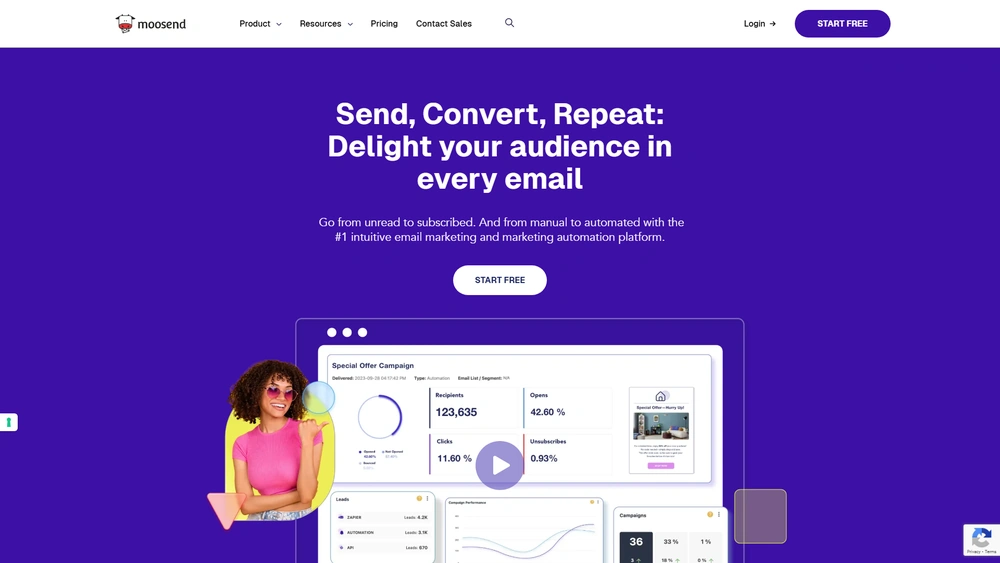Moosend Overview & 2025 Industry Position
Moosend has quietly but confidently risen to stand toe-to-toe with major email marketing solutions in the SMB and mid-market segments. Built with automation at its core and refined through consistent UX improvements, Moosend platform in 2025 is a smart choice for businesses focusing on growth without overwhelming tech complexity. Balancing affordability with enterprise-lite features, it’s a top contender for companies looking for customizable automation, advanced segmentation, and reliable deliverability without bloated costs.
From Launch to 2025: Moosend’s Journey
Founded in 2011 in Athens, Greece, Moosend began as a simple email marketing tool focused on helping startups deliver better newsletters. Since then, it has scaled to a global platform with powerful automation, data personalization, and AI-driven tools. Key milestones include:
- 2015: Released automation workflows & behavioral triggers
- 2018: Launched API v2 and Zapier integration
- 2020: Acquired by Sitecore, enhancing enterprise features
- 2022: New drag-and-drop builder + AI subject line tester
- 2023: Introduced revenue reporting and CRM integrations
- 2024: UI overhaul & deeper Shopify, WooCommerce integrations
2025 Thesis: Moosend positions itself as the automation-first email solution for scaling SMBs—prioritizing usability, deliverability, and AI-assisted personalization.

Moosend Key Features
The Moosend toolkit is purpose-built for businesses seeking powerful email campaigns without the technical overhead. Here’s what stands out in 2025:
- Modern Automation Builder: Visual workflow interface with condition paths and goal metrics
- Drag-and-Drop Editor: Rebuilt in 2024 for ease of use, mobile-first design included by default
- AI Features: Subject line generator, send-time optimization, predictive segmentation
- Behavior Tracking: Track site visits, purchase events, and custom actions to trigger emails
- Advanced Segmentation: Combine demographics, behaviors, and custom fields in audience filters
- Built-in Landing Pages: Host high-converting templates with integrated forms
- Ecommerce Focus: Recover abandoned carts, upsell based on purchase history
- Real-time Analytics: Responsive dashboards tracking revenue, CTR, list growth, geo, and device data
Workflow & UX
Ease of use has always been a Moosend strong suit, and in 2025 it’s even more refined. The user flow from list-building to automated campaigns is intuitive, thanks to a left-side collapsible nav, strong onboarding, and contextual help popovers.
- Workflow builder supports up to 10 conditional branches
- Drag-and-drop logic elements for ease & speed
- Tooltips guide non-technical users through email logic
- Preview mode overlays test user data into flows
- Responsive design functions well across resolutions
Moosend Pricing Analysis & Value Metrics
Moosend continues to offer an excellent price-to-value ratio for SMBs. As of July 2025, pricing is as follows:
| Plan | Monthly Price | Included Contacts | Key Inclusions |
|---|---|---|---|
| Free Trial | $0 | 1,000 | All features for 30 days |
| Pro | $18 | Up to 1,000 | Automation, landing pages, segmentation, support |
| Pro+ | $58 | Up to 5,000 | Multi-user, SMTP, priority support |
| Enterprise | Custom | 10,000+ | Dedicated IP, onboarding, SLA |
Compared to similarly featured competitors, Moosend offers tremendous savings—often up to 30–50% lower—while keeping automation and ecommerce tools on par or superior.
Competitive Landscape
Moosend faces competitive pressure from MailerLite, ConvertKit, and ActiveCampaign. Here’s how they compare:
| Platform | Best For | Strengths | Pricing |
|---|---|---|---|
| Moosend | Growth-stage SMBs | Automation depth, UI, ecommerce triggers | From $18/month |
| MailerLite | Bootstrapper startups | Clean interface, low price | From $15/month |
| ConvertKit | Creators, influencers | Audience tagging, digital products | From $29/month |
| ActiveCampaign | Medium enterprises | CRM, multichannel marketing | From $39/month |
Use Cases
- Ecommerce: Recover carts, post-purchase automations, seasonal promotions
- Education Providers: Course onboarding, webinar invites, student engagement
- Agencies: Manage multiple client accounts with team permissions
- Nonprofits: Segmented donor outreach and automated updates
- SaaS Startups: Trial onboarding, feature announcements, churn reduction
Moosend Integrations
Moosend supports 100+ native and Zapier integrations across ecommerce, CRM, and advertising tools:
- Popular Apps: Shopify, WooCommerce, Stripe, PayPal, Calendly, Typeform
- CRM: HubSpot, Pipedrive, Salesforce (via Zapier)
- Lead Capture: WordPress, Elementor, ThriveLeads, OptinMonster
- Ads: Meta Pixel, Google Ads, LinkedIn audiences
Integrations are easy to connect and usually supported by step-by-step wizards inside the dashboard.
Pros & Cons
- Pros:
- Affordable yet robust marketing automation
- Visual journey builder with ecommerce triggers
- Responsive support even on lower tiers
- AI subject and segmentation suggestions boost performance
- Cons:
- Lacks true multichannel campaign capabilities (SMS, push)
- Template library not as expansive as Mailchimp
- Automation UI still lacks flow versioning
Pro Tip: To improve open rates, use Moosend’s send-time AI with A/B testing to identify weekly sweet spots for your audience segments.
Final Thoughts
Moosend strikes an exceptional balance of power and simplicity. In 2025, it remains one of the most cost-effective tools for small businesses and mid-tier organizations seeking top-tier automation without enterprise complexity. If you’re focused on ecommerce, education, or B2B SaaS and want results-backed workflows, Moosend automation gives you serious leverage over your competitors—without breaking the bank.
Moosend FAQ
Yes, Moosend offers a 30-day free trial with full feature access and up to 1,000 contacts.
Absolutely. Moosend has native Shopify integration for tracking purchases, carts, and customer data.
Yes, Moosend allows you to fully authenticate and use your sending domain to improve deliverability.
Phone support is available to Pro+ and Enterprise members. Other users can access support via live chat and email.
Moosend offers more affordable automation with stronger ecommerce tools, while Mailchimp has broader multichannel options and larger template selection.